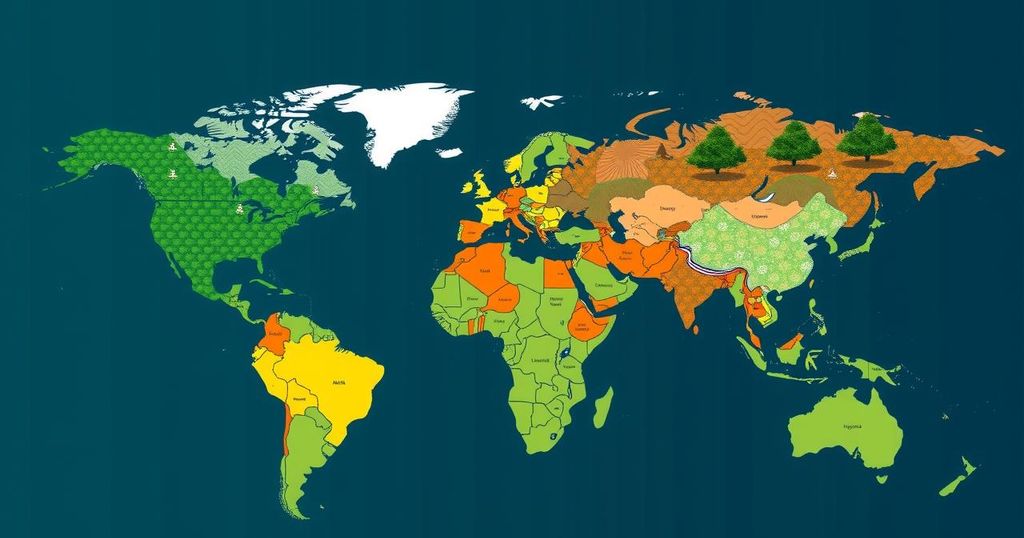Richer nations are starting to provide financial compensation to developing countries suffering from climate change impacts, exemplified by a $750 payment made to a Malawian family affected by Cyclone Freddy. At the COP29 summit, countries are negotiating further funding pledges, with experts warning that the overall amount is insufficient to address escalating climate-related damages.
As a result of Cyclone Freddy devastating southern Malawi in 2023, Christopher Bingala experienced a tragedy when floodwaters inundated his home. This cyclone, noted as the longest-lasting tropical cyclone recorded, caused widespread destruction, leading to his displacement along with his six children. Fortunately, Bingala received a loss and damage compensation payment of approximately $750. This payment enabled him to construct a new home, showcasing the emerging “loss and damage” funding model designed to assist individuals affected by climate change-related disasters.
Wealthier nations have acknowledged their responsibility toward poorer countries heavily impacted by climate change, pledging approximately $720 million in compensation through a fund aimed at addressing damages incurred from climatic upheavals. Despite the pledges, experts caution that this amount may be inadequate as extreme weather events, such as hurricanes and floods, continue to escalate.
At the ongoing COP29 climate summit in Baku, Azerbaijan, nations are discussing the extent of financial support owed to developing regions as part of a broader climate finance initiative. Prime Minister Philip Davis of the Commonwealth of the Bahamas emphasized the need for wealthier nations to recognize and fulfill their responsibilities: “We just hope that the global north and the nations whose economy is fueled by the emissions – they come to the plate and take up their responsibility to look at what they’re causing us.”
The fallout from Cyclone Freddy had far-reaching consequences, displacing around 650,000 individuals in Malawi alone, where a substantial rainfall occurred within just six days. While Bingala and his family initially sought refuge on higher ground, they faced food shortages, prompting desperate measures to survive. Upon receiving financial assistance, Bingala was able to relocate, build a more secure home, and provide a stable environment for his children.
Scotland has set a precedent as the first country to allocate resources specifically for loss and damage, with funds distributed via GiveDirectly, a non-profit organization. In total, approximately 2,700 families received cash payments, contributing to their recovery efforts. According to Yolande Wright, vice president of partnerships at GiveDirectly, low-income households in these regions lack insurance protections, making such financial assistance even more vital.
The initiative in Malawi serves as a pilot project that could inform future funding distributions to vulnerable nations heavily impacted by climate change. Approximately half of all greenhouse gas emissions since the Industrial Revolution can be traced back to the United States and Europe, despite those in developing nations being least responsible for the climate crisis.
The demand for loss and damage funding is projected to escalate, with estimates suggesting the need will soar to $250 billion annually by 2030 as climate disasters intensify. Prime Minister Davis expressed the urgency for developed nations to invest in these efforts, stating that failure to act could result in dire consequences not only for those in affected regions but also for the global community. “If they do nothing, they will be the worst for it,” he warned, highlighting the potential for climate-induced displacement and humanitarian crises that could extend beyond borders.
The topic of loss and damage funding arises amidst growing global concerns regarding the detrimental impacts of climate change, particularly on impoverished nations that contribute minimally to greenhouse gas emissions but suffer disproportionately from its effects. This funding model is intended to provide financial assistance to those affected by climate-related disasters, allowing them to rebuild their lives and communities. Wealthier nations, recognizing their role in the ongoing climate crisis, have begun to pledge resources, although the total committed amounts are often criticized as falling short of the actual needs.
In summary, the introduction of loss and damage funding represents a critical step in addressing the financial consequences of climate change for vulnerable populations. While initial commitments have been made by wealthier nations, the urgency for increased financial support remains. This funding initiative not only aids in immediate disaster recovery efforts but also emphasizes the moral obligation of developed countries to assist those most impacted by climate change, as the global community faces an unprecedented climate crisis that threatens stability and security.
Original Source: www.kwit.org






